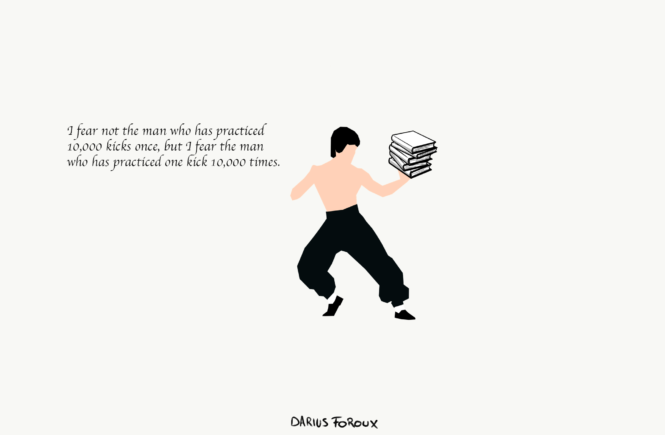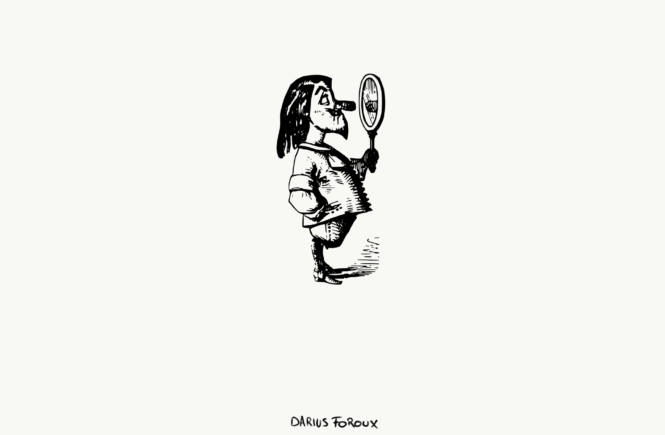How many books does a person read in a lifetime? I did the arithmetic one night over beers with a friend.
First, we established that averages are useless. Some statistics say that people read 12 books per year on average. There are always a few people who read more than 100 books a year. So that number is inflated.
Based on our experiences, most people we know only read a book that’s popular. For example, this year’s book was 12 Rules For Life by Jordan Peterson. Most people read books because “everybody has read this book!”
And then they might pick up one or two other books in a year. They probably won’t even finish them. But let’s be optimistic about people and assume most folks read 5 books a year. Over a 50-year career, that’s only 250 books.
But let’s say you’re different. You realize that reading is the single most important thing for your personal development. And you set a goal to read 2 books a week. And over your career, you fail to achieve it. It’s a lofty goal, after all.
But you still manage to finish 80 books a year. That’s 4,000 books! What’s the difference between 4,000 and 250? Well, a shitload of wisdom, my friend. And like you and I both know, when you apply wisdom, your life will be better. What’s the lesson here?
Read as your life depends on it. Why? Because it does. Here are the best books I’ve read this year.
Full Disclosure: I use affiliate links for book recommendations, which means that if you choose to make a purchase, I will earn a commission. This commission comes at no additional cost to you.
1. Incerto by Nassim Nicholas Taleb
Technically, this is a series that consists of five books. Before this year, I had never read Taleb. Several of my friends are big fans of his work. And when his latest book in the series, Skin In The Game, came out this year, I felt compelled to read it.
In his latest book, he writes about how most decision-makers have nothing to lose when things go wrong. Having skin in the game will change everything. After all, it’s easy to make a decision or give advice when you have nothing to lose.
I love his message and style. Taleb is someone who doesn’t care what certain people think of him. And he’s not afraid to make bold statements. He’s not only a good writer but the contents of his books are also excellent.
After I read Skin In The Game, I decided to read all his books. That took me about a month and I’m glad I did. If you haven’t read any of his books, check out which one appeals to you the most. You can read them in any order you want.
2. Laws Of Human Nature by Robert Greene
I got into personal development because of The 48 Laws Of Power. And with his latest book, Robert Greene, shows that living a successful life is not only about power and status.
How well we are at dealing with people is one of the most important predictors of career success. Since everything we do relies on others, we must get better at understanding others.
And what’s the best way to do that? By understanding yourself. And that’s what Laws Of Human Nature helps you with. Great book for improving your self-knowledge.
3. Stay Hungry by Sebastian Maniscalco
I love stand-up comedy, but I had never heard of Sebastian until recently. When I saw his Netflix comedy special and read about his story, he instantly became one of my favorite comedians.
He’s not only funny, but he’s also humble, down to earth, and a hard worker. For 20 years, he’s been working at his craft. For the first 7 years, he also worked at the Four Seasons hotel. Now, he’s selling out arenas.
In Stay Hungry, he shares his life story in a funny way. So if you want to quit your career after only a year, please read Sebastian’s story.
4. The Snowball by Alice Schroeder
Even though I think some parts of this book were a little bit of information overload, I thoroughly enjoyed reading about Buffett’s life. Contrary to what you might think, this book is not only about investing.
The Snowball goes deep on different topics like Buffett’s relationships with the most important people in his life, the way he views the world, and how he conducts business. Every professional can learn from his life story. And Alice Schroeder did a great job telling it.
5. The Mastery Of Love by Don Miguel Ruiz
This book changed my perspective on love. As the relationship between my girlfriend and I became more serious this year, we both wanted to improve this area.
Subconsciously, we often keep score in our relationships. We have an internal scoreboard for everything, from how often one called/texted the other, who says I love you more or cares more about certain things than the other.
In The Mastery Of Love, Ruiz writes a lot about unconditional love. He believes that love is a never-ending resource. So you don’t need to keep score if you can always give. Plus, if you already have love, you don’t need anything in return. My experience is that this strategy works best if you both change your perspective.
When only one person in a relationship adopts this perspective, it might work for a while, but you often fall back to your old behavior. So if you decide to read it, ask your partner to do the same.
6. 12 Rules For Life by Jordan B. Peterson
As you can tell, I read books from all types of philosophies. The last book is spiritual, and 12 Rules For Life is very practical and hard-hitting.
Like almost everyone who is interested in personal development, I read Jordan Peterson’s popular book this year. I share many of his beliefs. And like he says, there’s nothing new about taking responsibility for your life.
However, it is NEW to give people tough love — which is exactly what this book does. Read it — regardless of your views. It will make you a more stable and reliable person.
7. Philosophy As a Way of Life by Pierre Hadot
Hadot was one of the best historians of philosophy in recent history. I’ve been reading philosophy since I was 16 and somehow believed that writing ABOUT philosophy is not the same thing.
But Hadot proves that writing about philosophy is just as, or even better, as the real thing. I read Philosophy As a Way of Life this year and it made me understand the concepts of Socrates, Plato, Stoicism, Epicureans, and Cynicism a lot better.
What I learned is that philosophers are all searching for the same thing: To satisfy their thirst for knowledge. Philosophy comes from the Greek word philosophia, which translates to “love of wisdom.” And if you love wisdom, you’ll love this book.
8. Elon Musk by Ashlee Vance
I’m not a fan of Elon Musk. People in personal development are always surprised by that. I don’t know why, but I can’t idolize assholes — no matter how successful they are.
However, my opinion on Musk did change after reading this book. He might be a weird guy, but he also has a crazy work ethic and ability to focus like no one else on this planet.
Can you learn from outliers? Sure. But this book is mostly for entertainment. I personally know no one who wants to be like Musk. I sure as hell don’t. But I can still learn from the man.
9. The Complete Divan of Hafez by Hafez
Most people are familiar with the other Persian poet, Rumi. But Hafez is the one who’s more read in his native country. I used to be a lot into poetry but stopped reading it for many years until I received this book as a gift from my girlfriend.
Sometimes I open the book and read a poem or three. Hafez is spiritual and sometimes I have no clue what he’s talking about. But it makes you think. And that’s a good feeling.
10. Seeking Wisdom by Peter Bevelin
This is probably the best summary I’ve read on practical and scientific thinking. Bevelin is an excellent writer and he captures the wisdom from Charlie Munger in a perfect way.
The book respects the reader and doesn’t show off. It’s a book that I already referred to several times after reading it. And together with the Jordan Peterson and Pierre Hadot books, I plan to re-read these books going forward.
Just like the title of Bevelin’s book, to me, life is about seeking wisdom. It’s the only pursuit that we can perform as long as our brain works. You can get physically impaired, lose your money, friends, status, but you can never lose your thirst for knowledge.
In fact, writing this article made me thirsty. It’s time to devour another book.




